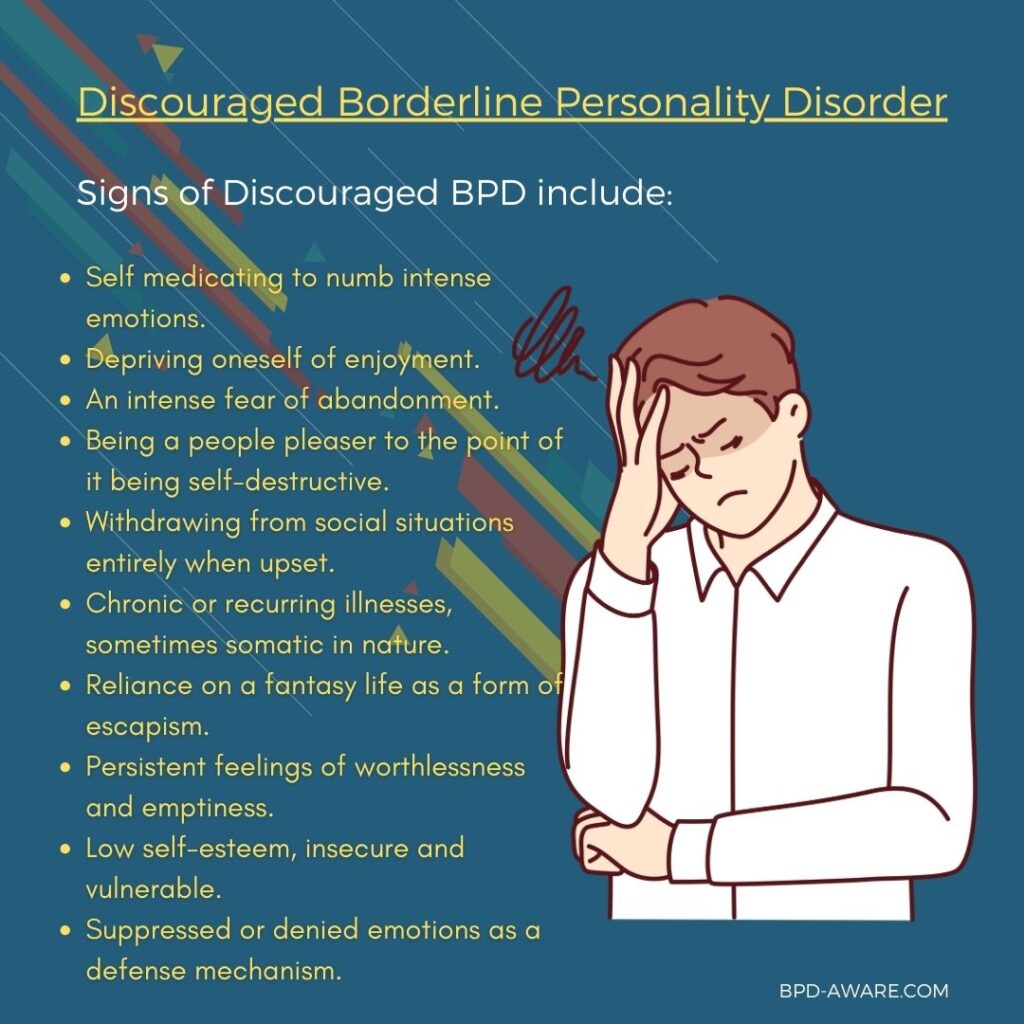Discouraged BPD (also known as Quiet BPD) is one of the four subtypes of BPD alongside Impulsive BPD, Petulant BPD, and Self-Destructive BPD. Someone with BPD may have more than one subtype or move from type to type throughout their life.
Discouraged BPD looks quite different from the other kinds of BPD and can often go undiagnosed because of this. Someone with Discouraged BPD frequently internalizes their emotional turmoil, meaning that people around them might never know they have a problem. However, their relationships can come across as dependent, which causes some people with Discouraged BPD to be misdiagnosed with dependency disorder.
What are the Signs and Symptoms of Discouraged Borderline Personality Disorder?
- Self-medicating with alcohol and drugs to numb intense emotions.
- Depriving oneself of enjoyment in life because of feeling worthless.
- An intense fear of abandonment.
- Seen as more of a follower than a leader because of passive and clingy traits.
- Being a people pleaser to the point of it being self-destructive.
- Withdrawing from social situations entirely when upset.
- Chronic illnesses, which can be somatic.
- Reliance on a fantasy life. People with Discouraged BPD will often be deeply passionate about reading, playing video games, or watching TV/movies as escapism.
- Persistent feelings of worthlessness and emptiness.
- Low self-esteem, insecure, and vulnerable. They can often come across as overly humble or self-deprecating.
- Suppressed or denied emotions as a defense mechanism.

Problems People with Discouraged BPD Face
The symptoms of Discouraged BDP can make life incredibly difficult for sufferers. Healthy relationships, in particular, can be challenging to maintain as someone with Discouraged BPD can attract people who take advantage of their desire to please and their fear of abandonment, leading to toxic relationships.
Some with Discouraged BPD will attempt to avoid most forms of interpersonal relationships and come across as profoundly introverted “loners” in an effort not to be hurt by others. People with Discouraged BPD will often compensate for this with obsessions over social media, video games, books, and even pornography. This can lead to severe depression because of a lack of physical and social interaction.
Discouraged BPD can be much more complex to diagnose as it’s the most atypical form of BPD. Those with Discouraged BPD have essentially masked and internalized many of their symptoms.
Personal Accounts of Living with Discouraged BPD
“I couldn’t escape the constant fear of being abandoned by everyone I was close to. It felt better to avoid friends rather than get rejected by them. Gradually, my friends dropped off, tired of me always canceling plans and finding excuses not to spend time with them. It felt better that way. It felt better to be alone by my ‘choice’ than theirs. One day, I looked around and realized I was alone and had no one to blame but myself. I knew I had to change, but I had no idea where to start or what to do.” – Lily M.
“Our relationship began so promisingly. My girlfriend loved me and treated me with respect. Day by day, week by week, it began to erode. Soon, I was being taken for granted and taken advantage of. But I couldn’t leave. How could I? What would happen to me if I were all alone? I’d wither away and die. Better to be mistreated and have someone in my life than alone.” – Ashley G.
“I saw myself as a horrible person that no one would ever want to be with. I found myself apologizing all the time, even for things that weren’t my fault. Even now, I struggle not to say sorry all the time. Standing up for myself is a constant internal battle that wears me out. Sometimes, I win that battle; other times, I don’t. I’m getting better at it, though, even if it’s taking longer than I’d like.” – Naya S.
Sources, Resources, and Further Reading
- All About Quiet BPD: https://www.healthline.com/health/quiet-bpd
- What Is Discouraged Borderline Personality Disorder?: https://www.optimumperformanceinstitute.com/bpd-treatment/discouraged-borderline-personality-disorder/
- Borderline Personality Disorder: Classic or Quiet: https://www.borderlinearts.org/single-post/bpd-quiet-or-classic
- Understanding Quiet BPD: https://beatanxiety.me/understanding-quiet-bpd-borderline-personality-disorder/
- Do You Have “Quiet BPD”?: https://www.psychologytoday.com/us/blog/living-with-emotional-intensity/201909/do-you-have-quiet-bpd
















